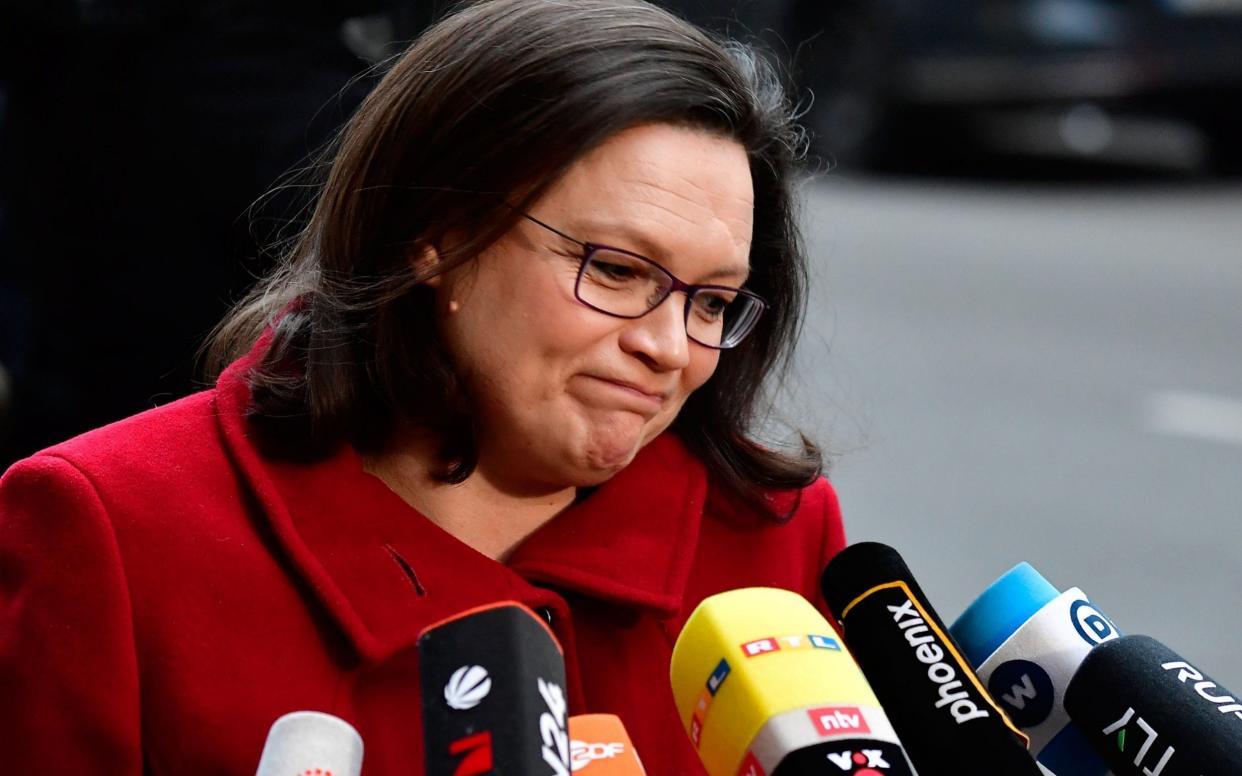Angela Merkel's future in doubt as leader of coalition partner quits

The future of Angela Merkel’s government was in doubt on Sunday after the leader of her main coalition partner resigned.
Andrea Nahles announced she was stepping down as leader of the centre-Left Social Democrats (SPD) after the party suffered its worst ever result in the European elections.
Her decision led to renewed calls for the SPD to pull out of Mrs Merkel’s coalition government, which would leave it without a majority in parliament.
But the party’s MPs are believed to be reluctant to force new elections in which they could suffer even more damaging losses.
Ms Nahles’ resignation came as a shock new opinion poll showed the German Green party in first place for the first time, after overtaking Mrs Merkel’s Christian Democrats (CDU).
“Discussions and feedback from the party have made it clear to me that I no longer have the necessary support to continue in office,” Ms Nahles said in a statement to party members on Sunday.
“I sincerely hope that you will be able to restore trust and mutual respect again and find a leader you can support.”
Her decision to step down after just a year in office comes amid panic in the party at its rapidly collapsing vote.
One of the two mainstream German political parties, the SPD has seen its role on the centre-Left usurped by the Greens in recent years.
Ms Nahles took over as party leader in the wake of the decision to enter a new coalition with Mrs Merkel after the SPD suffered its worst ever general election result in 2017, winning just 20 per cent of the vote.
But the party’s support has continued to plunge under her leadership. It came third in the European elections with only 15.8 per cent, and hit a new low of just 12 per cent in an opinion poll released at the weekend.
Facing growing discontent within the party and a rumoured coup plot by her predecessor as leader, Martin Schulz, Ma Nahles issued a “back me or sack me” ultimatum to MPs by calling a vote on her leadership scheduled for Tuesday.

But it became clear that her gamble had failed as support for her failed to materialise , and she stepped down rather than face the humiliation of a vote. Malu Dreyer, a regional party leader untainted by the infighting, is expected to take over as interim SPD leader until fresh elections can be held.
As leader, Ms Nahles tried to heal the wounds of a bruising party dispute that saw a Momentum-style grassroots campaign narrowly fail to block a new coalition with Mrs Merkel.
Her resignation seems almost certain to reopen that debate, with many on the left of the SDP convinced that withdrawing from the government is the only way to restore the party’s fortunes.
Mrs Merkel has already said she will not fight another election, and there is no obvious alternative coalition partner.
But most observers think the SPD will not be prepared to risk new elections while it is doing so badly in the opinion polls.
“Nobody wants to be the author of his own downfall. Even the SPD does not want to destroy itself,” Werner Weidenfeld, a leading German political scientist, told Bild newspaper.
Most of the SPD’s losses have been at the hands of the German Green party. A new poll released at the weekend showed the Greens in first place for the first time on 27 per cent, just ahead of Mrs Merkel’s CDU on 26 per cent.
The SPD were third on 12 per cent, ahead of the nationalist Alternative for Germany party (AfD), which continued to fall well short of its highs of last year on just 11 per cent.
Meanwhile a separate poll found that only 3 per cent of Germans believe Mrs Merkel’s government is doing enough on environmental issues.

